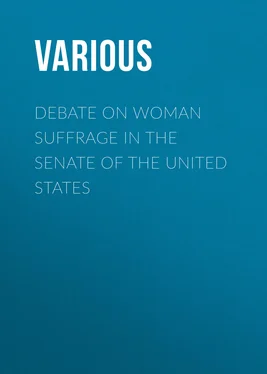Various - Debate on Woman Suffrage in the Senate of the United States
Здесь есть возможность читать онлайн «Various - Debate on Woman Suffrage in the Senate of the United States» — ознакомительный отрывок электронной книги совершенно бесплатно, а после прочтения отрывка купить полную версию. В некоторых случаях можно слушать аудио, скачать через торрент в формате fb2 и присутствует краткое содержание. Жанр: foreign_antique, Политика, на английском языке. Описание произведения, (предисловие) а так же отзывы посетителей доступны на портале библиотеки ЛибКат.
- Название:Debate on Woman Suffrage in the Senate of the United States
- Автор:
- Жанр:
- Год:неизвестен
- ISBN:нет данных
- Рейтинг книги:4 / 5. Голосов: 1
-
Избранное:Добавить в избранное
- Отзывы:
-
Ваша оценка:
- 80
- 1
- 2
- 3
- 4
- 5
Debate on Woman Suffrage in the Senate of the United States: краткое содержание, описание и аннотация
Предлагаем к чтению аннотацию, описание, краткое содержание или предисловие (зависит от того, что написал сам автор книги «Debate on Woman Suffrage in the Senate of the United States»). Если вы не нашли необходимую информацию о книге — напишите в комментариях, мы постараемся отыскать её.
Debate on Woman Suffrage in the Senate of the United States — читать онлайн ознакомительный отрывок
Ниже представлен текст книги, разбитый по страницам. Система сохранения места последней прочитанной страницы, позволяет с удобством читать онлайн бесплатно книгу «Debate on Woman Suffrage in the Senate of the United States», без необходимости каждый раз заново искать на чём Вы остановились. Поставьте закладку, и сможете в любой момент перейти на страницу, на которой закончили чтение.
Интервал:
Закладка:
The labor in our fields, sowing, cultivating, and reaping crops must be discharged mainly by the male sex, as the female sex, for want of physical strength, are generally unable to discharge these duties. As it is the duty of the male sex to perform the obligations to the State, to society, and to the family, already mentioned, with numerous others that might be enumerated, it is also their duty to aid in the government of the State, which is simply a great aggregation of families. Society can not be preserved nor can the people be prosperous without good government. The government of our country is a government of the people, and it becomes necessary that the class of people upon whom the responsibility rests should assemble together and consider and discuss the great questions of governmental policy which from time to time are presented for their decision.
This often requires the assembling of caucuses in the night time, as well as public assemblages in the daytime. It is a laborious task, for which the male sex is infinitely better fitted than the female sex; and after proper consideration and discussion of the measures that may divide the country from time to time, the duty devolves upon those who are responsible for the government, at times and places to be fixed by law, to meet and by ballot to decide the great questions of government upon which the prosperity of the country depends.
These are some of the active and sterner duties of life to which the male sex is by nature better fitted than the female sex. If in carrying out the policy of the State on great measures adjudged vital such policy should lead to war, either foreign or domestic, it would seem to follow very naturally that those who have been responsible for the management of the State should be the parties to take the hazards and hardships of the struggle.
Here, again, man is better fitted by nature for the discharge of the duty—woman is unfit for it. So much for some of the duties imposed upon the male sex, for the discharge of which the Creator has endowed them with proper strength and faculties.
On the other hand, the Creator has assigned to woman very laborious and responsible duties, by no means less important than those imposed upon the male sex, though entirely different in their character. In the family she is a queen. She alone is fitted for the discharge of the sacred trust of wife and the endearing relation of mother.
While the man is contending with the sterner duties of life, the whole time of the noble, affectionate, and true woman is required in the discharge of the delicate and difficult duties assigned her in the family circle, in her church relations, and in the society where her lot is cast. When the husband returns home weary and worn in the discharge of the difficult and laborious task assigned him, he finds in the good wife solace and consolation, which is nowhere else afforded. If he is despondent and distressed, she cheers his heart with words of kindness; if he is sick or languishing, she soothes, comforts, and ministers to him as no one but an affectionate wife can do. If his burdens are onerous, she divides their weight by the exercise of her love and her sympathy.
But a still more important duty devolves upon the mother. After having brought into existence the offspring of the nuptial union, the children are dependent upon the mother as they are not upon any other human being. The trust is a most sacred, most responsible, and most important one. To watch over them in their infancy, and as the mind begins to expand to train, direct, and educate it in the paths of virtue and usefulness is the high trust assigned to the mother. She trains the twig as the tree should be inclined.
She molds the character. She educates the heart as well as the intellect, and she prepares the future man, now the boy, for honor or dishonor. Upon the manner in which she discharges her duty depends the fact whether he shall in future be a useful citizen or a burden to society. She inculcates lessons of patriotism, manliness, religion, and virtue, fitting the man by reason of his training to be an ornament to society, or dooming him by her neglect to a life of dishonor and shame. Society acts unwisely when it imposes upon her the duties that by common consent have always been assigned to the stronger and sterner sex, and the discharge of which causes her to neglect those sacred and all important duties to her children and to the society of which they are members.
In the church, by her piety, her charity, and her Christian purity, she not only aids society by a proper training of her own children, but the children of others, whom she encourages to come to the sacred altar, are taught to walk in the paths of rectitude, honor, and religion. In the Sunday-school room the good woman is a princess, and she exerts an influence which purifies and ennobles society, training the young in the truths of religion, making the Sunday-school the nursery of the church, and elevating society to the higher planes of pure religion, virtue, and patriotism. In the sick room and among the humble, the poor, and the suffering, the good woman, like an angel of light, cheers the hearts and revives the hopes of the poor, the suffering, and the despondent.
It would be a vain attempt to undertake to enumerate the refining, endearing, and ennobling influences exercised by the true woman in her relations to the family and to society when she occupies the sphere assigned to her by the laws of nature and the Divine inspiration, which are our surest guide for the present and the future life. But how can woman be expected to meet these heavy responsibilities, and to discharge these delicate and most important duties of wife, Christian, teacher, minister of mercy, friend of the suffering, and consoler of the despondent and needy, if we impose upon her the grosser, rougher, and harsher duties which nature has assigned to the male sex?
If the wife and the mother is required to leave the sacred precincts of home, and to attempt to do military duty when the state is in peril; or if she is to be required to leave her home from day to day in attendance upon the court as a juror, and to be shut up in the jury room from night to night with men who are strangers while a question of life or property is being discussed; if she is to attend political meetings, take part in political discussions, and mingle with the male sex at political gatherings; if she is to become an active politician; if she is to attend political caucuses at late hours of the night; if she is to take part in all the unsavory work that may be deemed necessary for the triumph of her party; and if on election day she is to leave her home and go upon the streets electioneering for votes for the candidates who receive her support, and mingling among the crowds of men who gather round the polls, she is to press her way through them to the precinct and deposit her ballot; if she is to take part in the corporate struggles of the city or town in which she resides, attend to the duties of his honor, the mayor, the councilman, or of policeman, to say nothing of the many other like obligations which are disagreeable even to the male sex, how is she, with all these heavy duties of citizen, politician, and officeholder resting upon her shoulders, to attend to the more sacred, delicate, and refining trust to which we have already referred, and for which she is peculiarly fitted by nature? If she is to discharge the duties last mentioned, how is she, in connection with them, to discharge the more refining, elevating, and ennobling duties of wife, mother, Christian, and friend, which are found in the sphere where nature has placed her? Who is to care for and train the children while she is absent in the discharge of these masculine duties?
If it were proper to reverse the order of nature and assign woman to the sterner duties devolved upon the male sex, and to attempt to assign man to the more refining, delicate, and ennobling duties of the woman, man would be found entirely incompetent to the discharge of the obligations which nature has devolved upon the gentler sex, and society must be greatly injured by the attempted change. But if we are told that the object of this movement is not to reverse this order of nature, but only to devolve upon the gentler sex a portion of the more rigorous duties imposed by nature upon the stronger sex, we reply that society must be injured, as the woman would not be able to discharge those duties so well, by reason of her want of physical strength, as the male, upon whom they are devolved, and to the extent that the duties are to be divided, the male would be infinitely less competent to discharge the delicate and sacred trusts which nature has assigned to the female.
Читать дальшеИнтервал:
Закладка:
Похожие книги на «Debate on Woman Suffrage in the Senate of the United States»
Представляем Вашему вниманию похожие книги на «Debate on Woman Suffrage in the Senate of the United States» списком для выбора. Мы отобрали схожую по названию и смыслу литературу в надежде предоставить читателям больше вариантов отыскать новые, интересные, ещё непрочитанные произведения.
Обсуждение, отзывы о книге «Debate on Woman Suffrage in the Senate of the United States» и просто собственные мнения читателей. Оставьте ваши комментарии, напишите, что Вы думаете о произведении, его смысле или главных героях. Укажите что конкретно понравилось, а что нет, и почему Вы так считаете.












